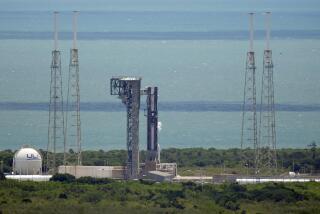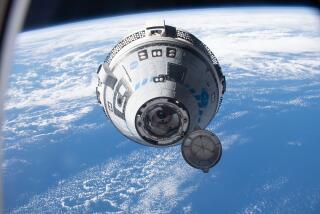Commander’s Sore Throat Delays Shuttle Flight
- Share via
KENNEDY SPACE CENTER, Fla. — The commander of the Atlantis got a sore throat Wednesday, forcing NASA to postpone for at least 24 hours the launch of the shuttle on a secret military mission to put a satellite in orbit.
A space agency statement said a forecast for bad weather also was a factor in postponement of the liftoff, which had been scheduled for today, but officials said they would have continued the countdown if not for the illness.
Navy Capt. John O. Creighton has “a sore throat with a little head congestion,” National Aeronautics and Space Administration spokesman Kyle Herring said. “He does not have a fever. It could be an indication of a cold coming on.”
Herring said Creighton will not be replaced on the flight because his illness is not serious. NASA said Creighton’s health and the weather will be evaluated today in deciding whether to attempt a launch Friday morning.
“We’ve never had a postponement due to the illness of an astronaut; this is the first time in the space program,” Herring said.
In 1970, astronaut Thomas K. Mattingly was taken off the Apollo 13 crew a few days before the flight was to lift off for the moon. But backup astronaut Jack Swigert replaced him without delaying the flight.
Herring said that Creighton and the other four Atlantis crew members were healthy when they took a physical exam Tuesday and that Creighton had approached the flight surgeon Wednesday with his problem. In the last week, the crew’s contact has been limited to immediate family members and essential launch officials to reduce the possibility of exposure to illness.
The afternoon announcement came shortly before technicians were to begin pumping more than half a million gallons of propellant into Atlantis’ fuel tank for the four-day mission.
Sources who spoke on condition of anonymity reported that the astronauts are to deploy a 37,300-pound, $500-million spy satellite capable of taking super-sharp reconnaissance photos and listening in on military and diplomatic communications around the world.
More to Read
Sign up for Essential California
The most important California stories and recommendations in your inbox every morning.
You may occasionally receive promotional content from the Los Angeles Times.













